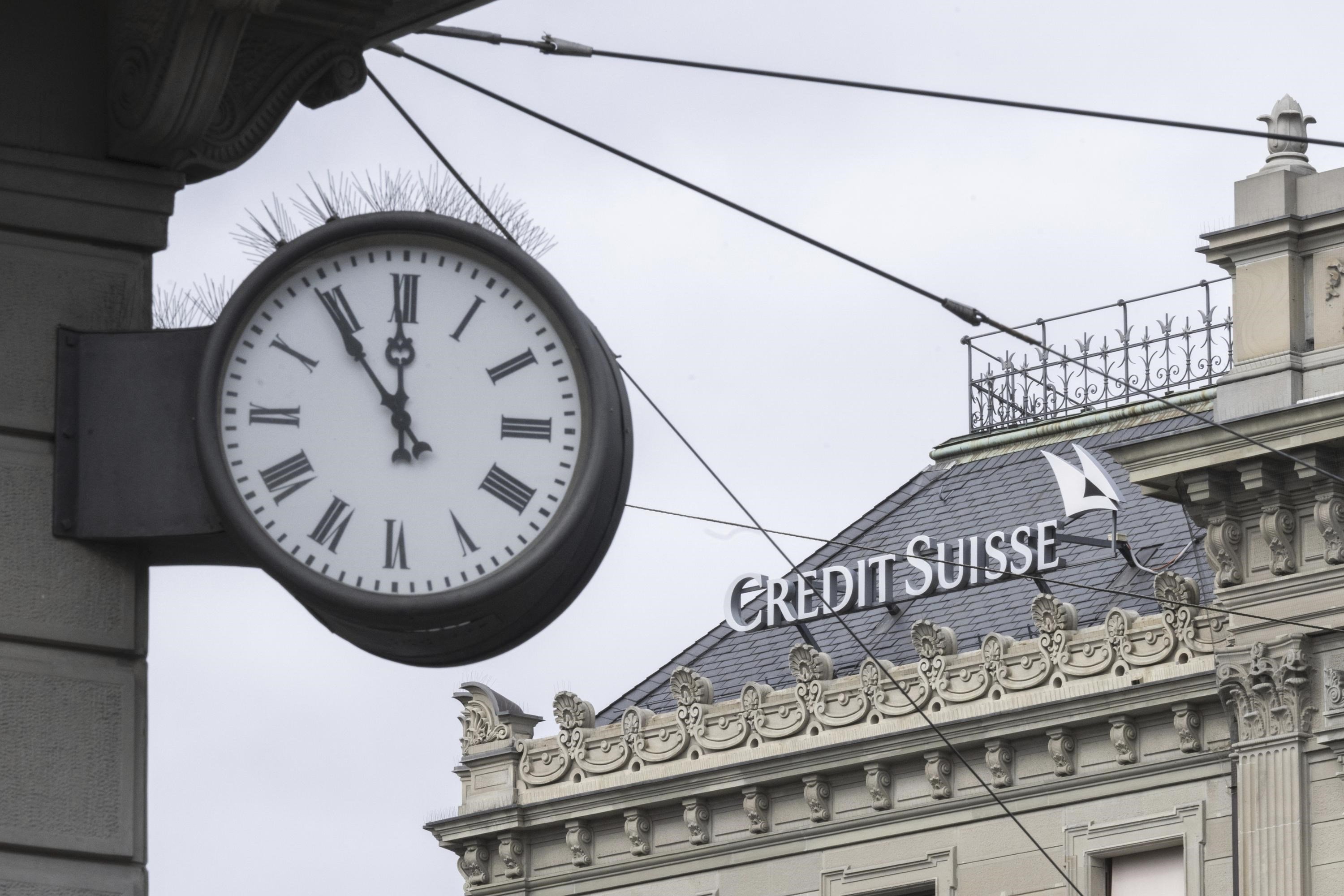Saudi Arabia one of biggest losers in Credit Suisse fail: WSJ
This serves as a reminder of how Gulf nations were also hit hard in the financial crisis of 2008-2009, which saw the value of foreign assets by the Gulf Cooperation Council (GCC) states in 2008 plunge by $100 billion.
-

A clock is seen near the Swiss bank Credit Suisse in Zurich on March 20, 2023. (AP)
Per Saudi Crown Prince Mohammed bin Salman's order, the government-backed Saudi National Bank made a $1.5 billion investment in Credit Suisse Group AG last year - that now is almost down to zero following Credit Suisse’s emergency merger with UBS Group AG this week.
Billions of dollars in investments have also been washed out from Qatar’s sovereign fund and the Saudi-based Olayan family. This serves as a reminder of how Gulf nations were also hit hard in the financial crisis of 2008-2009, during which the foreign assets held in portfolios of Gulf Cooperation Council (GCC) states in 2008 plunged by $100 billion, down to a total of $1.2 trillion. These numbers do not include the personal holdings of the ruling families.
UBS bank shares plunged by almost nine percent as markets opened on Monday, a mere day after it was announced that the bank will take over its rival Credit Suisse for $3.25 billion.
Moreover, shares of Credit Suisse opened almost 64 percent lower, well below the UBS takeover price.
After weekend intense talks aimed at preventing a wider international banking crisis, UBS announced it was ready to take over Swiss rival Credit Suisse for $3.25 billion. Meanwhile, Asian shares fell Monday on lingering concerns about the industry.
It goes back to MBS' direct orders
David Butter, a Middle East economics analyst at London-based think tank Chatham House, explains that no heavy investments have been put in foreign banks by Saudi banks until the kingdom recently started aiming for a larger global banking agenda, mainly including increasing the investment weight of the Saudi sovereign-wealth fund, the Public Investment Fund (PIF) - amounting to $600 billion.
Read next: UBS reports Credit Suisse buyout, stocks plunge on opening
Former Citigroup Inc. banker, Michael Klein, made the PIF connection to Credit Suisse last year when the bank was seeking to increase wealth management and Klein served as a Credit Suisse board member. Saudi PIF execs viewed the investment as a major risk, as they were concerned with legal issues and predicted future losses.
The investment, okayed by MBS, made the Saudi National Bank the biggest shareholder in Credit Suisse. In October, Saudi National Bank Chairman Ammar al-Khudairy told The Wall Street Journal that the Swiss Bank still held value for Saudi Arabia, even though it was suffering from hefty losses and financial scandals since the kingdom was relying on it to modernize its oil-dependent economy with the world becoming more reliant on renewables.
“The Saudi market [is] the 700-pound gorilla economically in the region, and just getting them to engage with us in Saudi Arabia would be more than good enough,” Khudairy stated.
In February last year, Credit Suisse was accused of allowing a suspected Bulgarian cocaine trafficking ring to launder millions of euros, some of which were hidden in suitcases. Prosecutors claim that between 2004 and 2008, the country's second-largest bank and one of its former relationship managers failed to take all necessary steps to prevent alleged drug traffickers from hiding and laundering cash.
Switzerland rejects $5bln from KSA
Qatar, known for its wealth from natural gas resources, started buying shares at Credit Suisse in 2008 when the financial crisis began and ordered private investors to invest billions of dollars after the Lehman Brothers crash.
In 2011, Qatar and the Saudi Olayan family combined added another $6.2 billion into Credit Suisse and two years later, more than $4.5 billion of that amount was transferred by Qayar into bonds called Additional Tier 1 capital notes, which are expected to be washed out with the current Credit Suisse failure.
Read next: Credit Suisse takes $54bln loan from Swiss central bank after plunge
On Wednesday, Khudairy relayed to Bloomberg TV that the Saudi National Bank “absolutely (will) not” aid Credit Suisse if it requests more capital because the Saudi Bank owned 9.9% of the Swiss institution and wasn’t willing to go over 10%.
Recently, the Saudi National Bank proposed to the Swiss Bank an investment of $5 billion, according to The Wall Street Journal, which would have allowed the latter's shareholders to be fully protected. However, ministers in Switzerland rejected the proposal.
Major shareholders were contacted by Credit Suisse to notify them of the potential investment losses to come and called on them to discuss their rights as shareholders.
Investors are concerned due to this taking place just days after the Silicon Valley Bank (SVB) collapsed, marking the second largest bank failure in US history.
SVB, America's 16th-largest bank, saw 60% of its shares plunge last week, marking one of the worst economic incidents in the US since the great market collapse of 2008 and prompting regulators to seize its assets and halt trade on its stocks in Nasdaq.

 5 Min Read
5 Min Read









